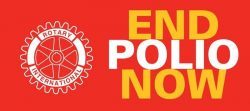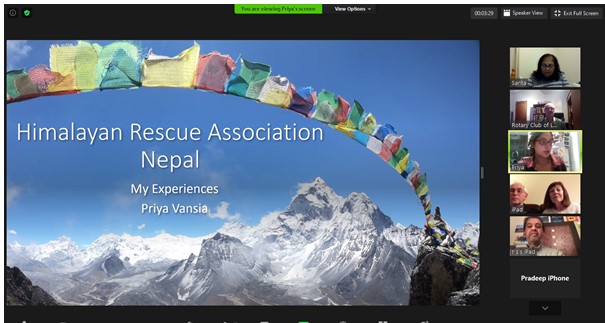
Priya Vansia, daughter of Novus’s Immediate Past President Maya Vansia nd her husband Pradip, showed her mother’s Rotary club stunning photos when she gave a fascinating talk on her voluntary work near Everest.
Priya explained that she had graduated from Nottingham Medical School in 2017 and spent two years in London. But she has also done voluntary work as a medic in Timor Leste, an island off the northern coast of Australia, in Darwin, where she found great inequalities between the white and the indigenous Aboriginal people, and then in Zambia, where she did her medical elective and found many deaths caused by HIV/Aids and tuberculosis.
Last year, not long before her marriage to Mathew, who she met at medical school, Priya and Mathew spent 12 weeks in Nepal, working with the Himalayan Rescue Association which was established in 1973.
They flew into Lukla and trekked for four days to the medical camp in the town reckoned to be the highest in the region — about 4,000 metres above sea level.
There, as part of a team of three foreign doctors, they provided care to anyone who needed it, whether climbers, trekkers, sherpas, porters and residents, seeing about 15 patients during their busiest days with one or two seeking treatment each night.
They had sufficient medicines, equipment and oxygen and charged 65 dollars for a consultation. Locals did not have to pay. In addition, the team gave a daily talk on altitude sickness, trying to prevent one of the most common and most dangerous health risks.
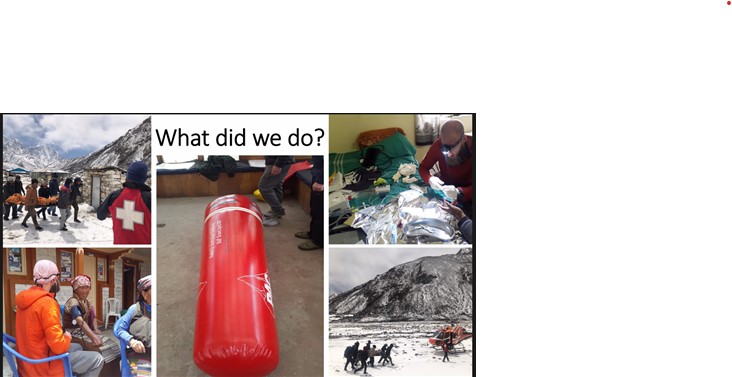
Priya recalled with sadness that one night, a young man died of altitude sickness because he did not seek help in time. One of the photos Priya showed included an image of a red compression unit to help patients who had climbed too quickly to too great an altitude.
Priya recounted that there was quite an adjustment to be made when she and Mathew arrived at the start of the Spring season. They arrived before the yak-dung collections had begun. The dung is burned to provide heating. Consequently, their early days were ‘freezing’ with early bedtimes the norm.
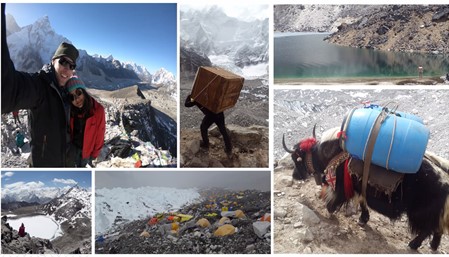
There was a flushing toilet. But for “Number Twos”, she said, it was necessary to walk across the snow to the outside lavatory. Solar power and batteries provided heat for a hot shower every few days.
Despite all the personal privations, Priya said that they might go back to volunteer their services in Nepal. Although not considering herself as an expert in altitude medicine, she said that if they were to go back, they would probably go to Everest Base Camp, a day’s further trek, because the medical needs would be different.
During their time there, Priya and Mathew dealt with lots of common conditions, including diarrhoea, and common colds. One patient had a tonsil abscess and one of the most urgent critical cases was a patient whose stomach ulcer burst.
The couple’s low points at the roof of the world involved ‘pseudo poverty’ where some tourist patients would try to avoid paying the 65 dollars even though it was a fraction of the thousands of pounds they would have had to have paid to fly to Nepal and to have porters and sherpas while there.
Another low point which clearly rankles with Priya was the scams. Some unscrupulous local guides, she said, would be paid commission by helicopter companies. Consequently, they guides would persuade climbers and trekkers to delay reporting illness so that a helicopter evacuation would be required.
Mathew and Priya, both now working at the Heath Hospital in Cardiff, would go on day treks on their days off and on one occasion Priya escorted the Canadian ambassador to Everest Base Camp. A perk was that they were offered accommodation in Delhi by the ambassador.
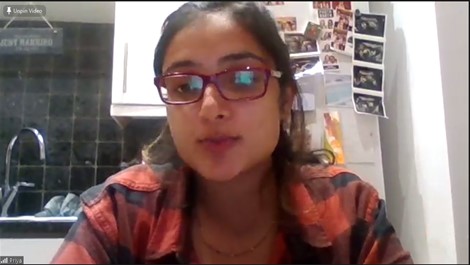
Last edited: 22.30 on Thursday, 08.10.2020

